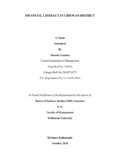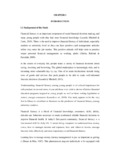Please use this identifier to cite or link to this item:
https://elibrary.tucl.edu.np/handle/123456789/1091Full metadata record
| DC Field | Value | Language |
|---|---|---|
| dc.contributor.author | Gautam, Menuka | |
| dc.date.accessioned | 2021-03-07T06:38:29Z | |
| dc.date.accessioned | 2021-07-22T04:58:28Z | - |
| dc.date.available | 2021-03-07T06:38:29Z | |
| dc.date.available | 2021-07-22T04:58:28Z | - |
| dc.date.issued | 2018 | |
| dc.identifier.uri | http://elibrary.tucl.edu.np/handle/123456789/1091 | - |
| dc.description.abstract | This study surveys 108employees in Chitwan District to examine their financial literacy; the impact of demographic, educational and personality characteristics on financial literacy. Mean, ANOVA and logistic regression were used in carrying out analysis. Results show that most of the employees have advance level of financial knowledge but they lack in understanding of money ilusion, compound interest and inflation. Employees are highly influenced by their life experience and job and they have positive attitude towards savings. The study further identified income, education level, education stream and financial behaviour as determinants of financial knowledge; and financial knowledge is unaffected by gender, financial influence and financial attitude. It is concluded that employees have advance level of financial knowledge. However, overall financial knowledge of the employees is affected by some of their demographic, educational and personality characteristics. | en_US |
| dc.language.iso | en_US | en_US |
| dc.publisher | Central Departmental of Management | en_US |
| dc.subject | Literacy | en_US |
| dc.subject | Management attitudes | en_US |
| dc.title | Financial Literacy in Chitwan District | en_US |
| dc.type | Thesis | en_US |
| Appears in Collections: | Finance | |
Files in This Item:
| File | Description | Size | Format | |
|---|---|---|---|---|
| Cover.pdf | 273.54 kB | Adobe PDF |  View/Open | |
| Chapter.pdf | 1.12 MB | Adobe PDF |  View/Open |
Items in DSpace are protected by copyright, with all rights reserved, unless otherwise indicated.
